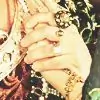INDIA has always been a spiritual rainforest, teeming with religions and their mutations. Fittingly, its greatest rulers have been as notable for their spiritual experiments as for their political ones. Ashoka, who ruled the Mauryan empire, India's first, at its apogee in the third century before Christ, was a convert to Buddhism. Jawaharlal Nehru, India's political leader to independence from British rule in 1947, and its first prime minister, was born into a high-caste Hindu family and became a resolute secularist. Mahatma Gandhi, his saintly fellow-worker for independence, was a devout Hindu, but challenged the orthodox with his campaign against untouchability. When political genius encounters India's sectarian profusion, it seems to breed a wayward spirituality.
No ruler took more liberties with his religion than Akbar, the greatest of the Mughals, the Muslim dynasty that dominated India between the early 16th and 18th centuries. Like Ashoka and Gandhi, Akbar constructed a religious ideology that served to hold together a diffuse polity as it fed his own soul.
It began with pragmatic policies of tolerance. Akbar had inherited the throne, at the age of 13, in 1556. In 1579 he abolished the jiziya, a tax imposed on all but the poorest non-Muslims. This was the most notable in a series of measures to recruit the Hindu majority and others to the cause of unifying and expanding his empire. He could be ruthless: his troops massacred 20,000-25,000 non-combatants after a four-month siege of Chitor, a nearly impregnable Hindu fortress in Rajasthan. But he preferred incentives to coercion. He defeated the war-like Rajputs, but gave them rank and married their princesses, who were permitted to conduct Hindu rites in the harem. The Mughal-Rajput alliance was a bulwark of his empire.
Akbar's liberalism in religion buttressed his other achievements. His generalship widened and enriched the Mughal empire. His administrative and fiscal innovations underpinned it for a century after his death. Not least, he fashioned a multicultural nobility into a kind of meritocracy, through a system of ranks dependent not on inheritance but on imperial favour.
Yet it is Akbar's religious tolerance that marks him"a fierce autocrat in politics"for his special place in history. It sprang as much from his character as from calculation. He was curious. Wondering whether speech was learned or innate, he had several infants reared in silence to find out. He is credited with innovations in textiles and artillery alike. Unable to read, perhaps because of dyslexia, he loved learning and disputation. He was subject to bouts of melancholy and what were probably epileptic fits early in life. He saw these as spiritual experiences; maybe they gave his curiosity a religious twist.
As his reign progressed Akbar moved ever further from Islamic orthodoxy. He built a capital, Fatehpur Sikri, around the tomb of a Sufi (Islamic mystic) saint who had prophesied the birth of his heir. Later he took to inviting clerics from various religions, including Portuguese Jesuits from Goa, to debate their faiths.
one of them wrote. They saw in him the common fault of the atheist, who refuses to make reason subservient to faith, accepting nothing as true which his feeble mind cannot fathom.
"If this is the definition of an atheist, the more we have of them the better," Nehru commented acidly 350 years later.
Eventually, Akbar came up with his own "religion of God", more a fraternal order, headed by himself, than a religion, based on a creed of harmony among peoples and a practice that involved making disciples of his leading nobles. Unsurprisingly, Muslim clerics saw this as blasphemy.
Eventually, it became official policy to discourage, if not to prohibit, Islamic forms of prayer. Akbar paid the price in an abortive rebellion by his son, claiming to be a defender of the faith. Akbar softened towards Islam thereafter, and is thought to have died, in 1605, a Muslim, not an apostate.
His descendants had learned the lesson"the wrong one. Successively, they became ever less tolerant. A century later, in 48 years of rule, his irreproachably pious and deeply bigoted great-grandson Aurangzeb tore down Hindu temples and revived the jiziya"and a Hindu consciousness that after his death was to help pull the Mughal empire apart and let in the British.
They, like Akbar, tried to deal equally with their diverse subjects. But the tensions remained; the Indian clich that these were largely due to a British policy of "divide and rule" is a self-excusing fantasy. As British rule faded, Muslim leaders demanded and in 1947 got a country, Pakistan, of their own. India's new rulers stuck to their belief that the state must remain above religion. Even so, Hindu hegemonists have recently come to the fore there.
Yet Akbar's fusion of religions is not quite dead: there is a Hindu village in the Kulu valley of the Himalayas whose local god is a reincarnation of him.





























12